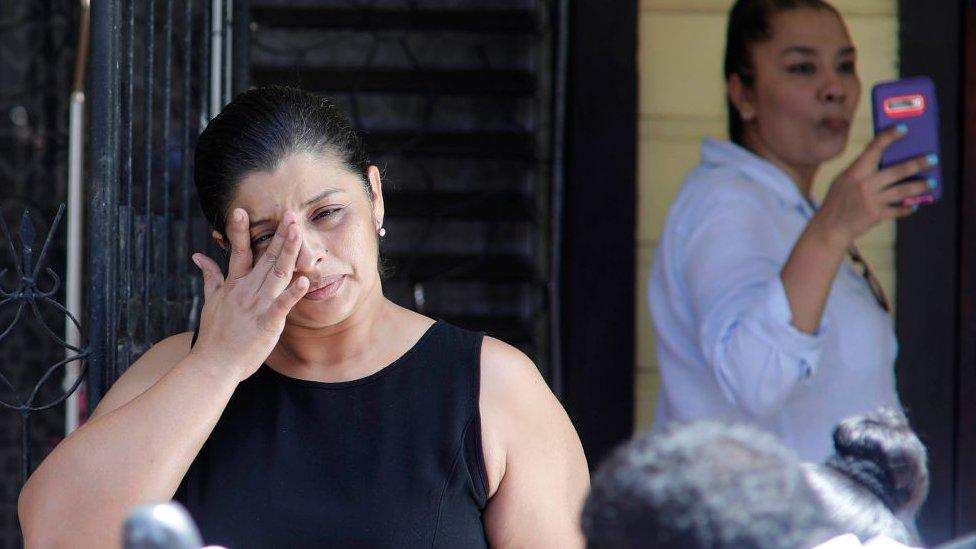Migrant deaths: How an American dream ended in horror
- Published
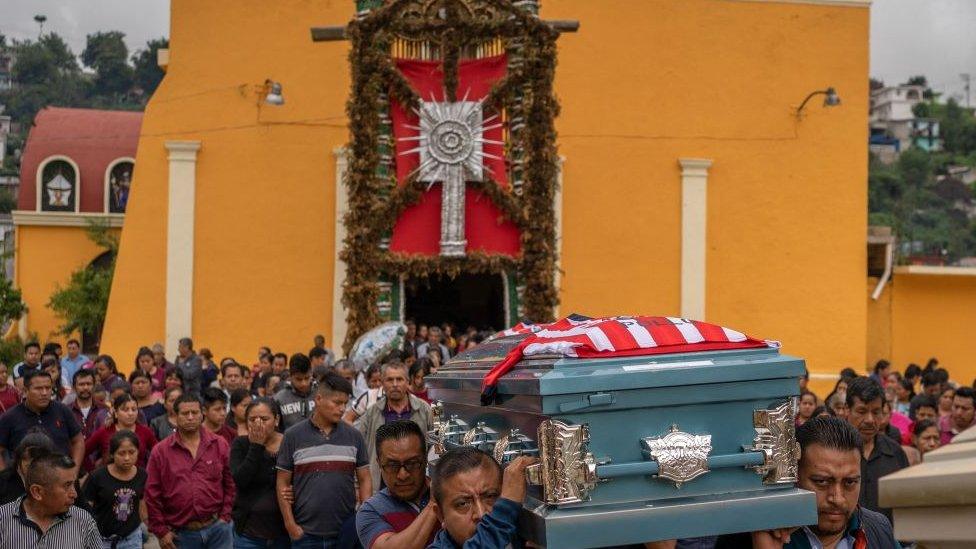
A funeral procession for Misael, Yovani and Jair through the streets of San Marcos Atexquilapan
The air outside the Olivares family home in San Marcos Atexquilapan hung thick with the smoke of burning firewood mixed with incense.
Propped up against the facade of their modest, two-storey house were three huge wreaths, one each for Misael, Yovani and Jair. Photographs of the three cousins sat in the centre of the floral arrangements, their soft features and unlined faces revealing just how young they were when they departed on their fateful journey north a few weeks ago.
Mirael and Yovani were both 16. Jair - the eldest, and Yovani's brother - was 20.
They were far too young to die, especially under such awful circumstances, abandoned inside an airless lorry trailer without water on a desolate back road in San Antonio, Texas, some 800 miles (1,300km) from home.


They were among the 53 migrants from Mexico, Honduras, Guatemala and El Salvador who died in June of heatstroke and dehydration in the deadliest human trafficking incident in US history.
Now, the bodies of the three young men - boys, really - were back in the village they set out from, their coffins side-by-side in the front room of the family home. And the entire community of San Marcos Atexquilapan had turned out to pay their respects and support the grieving family.
"In a way, I'm a little calmer now because I was so worried about them," said Yolanda, the mother of the two brothers, Jair and Yovani, as a steady stream of villagers trooped past to light candles at an altar erected in their memory.
Her uncertainty over their whereabouts, however, has been replaced by a profound sense of loss.
"While I know I'm never going to see them again, at least I'll have a place to go to mourn them and to bring them flowers."
As local men carved up six freshly slaughtered pigs, donated by local farmers, two more oinked forlornly on the back of a pick-up truck, perhaps aware their fates were sealed. Later, they too would have their throats slit and would end up in the pot.
Meanwhile the women cooked the pork into a spicy stew, served with tamales and washed down with copious amounts of sugary sodas.
It was comfort food, for a community desperately in need of some solace. The hive of activity around the cooking and the traditional funeral rites provided a welcome distraction for the family.
The Olivares boys left the village in search of one thing: greater economic opportunities. They weren't fleeing violence or organised crime, they weren't political exiles or seeking asylum from persecution. They were just young men hoping to reach Austin in Texas to make enough money to send home to their families. And to find new prospects beyond the limited horizons of the village they were born in.
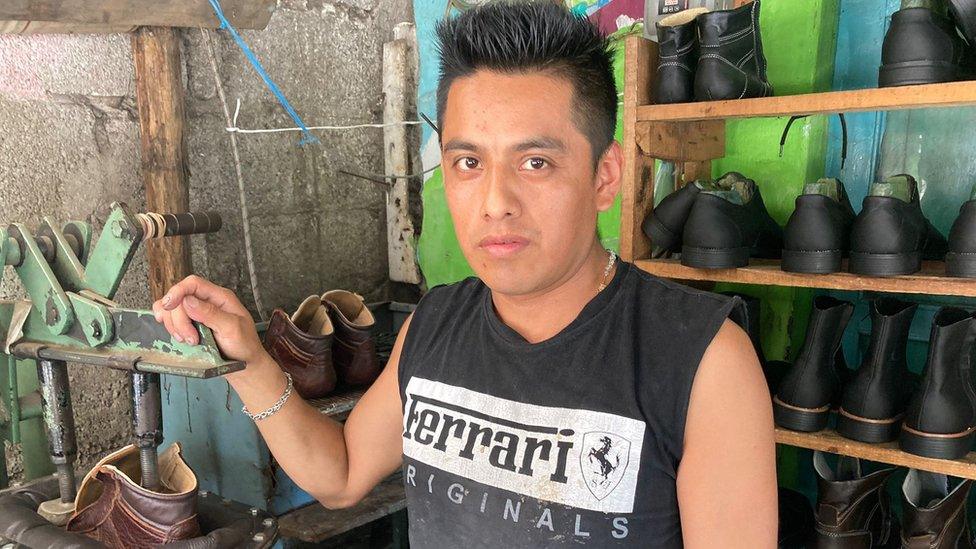
Tomas Valencia, a shoemaker and cousin of Misael, Jair and Yovani, has been thinking of making the same trip himself
It's a story which the mountain communities of the state of Veracruz know all too well.
"We knew the risks but they'd seen others make it (to the US), even young girls, and that motivated them into trying too," explained Yolanda, composed amid her grief.
"They had plans. They wanted to build a home, open a business, not just sit here making shoes."
The entire village of San Marcos Atexquilapan is one long production line for shoes and boots.
Many homes have a workshop in the front room, where father and son or two brothers might cut leather uppers for cowboy boots. Piles of half-finished shoes are then transported across town in wheelbarrows to a neighbour's workshop, where the soles are glued and final stitches added.
"We might make 80 pairs on a good day," said Tomas Valencia, a cousin of the dead Olivares brothers, as he used a compressed air machine to attach soles on to work boots. That generates an income of around $30-40 (£25-30) a week, he said, "but if we produce fewer pairs, we earn less".
It has led Tomas to seriously consider taking the same risky journey as his cousins - a temptation which has seemingly crossed the mind of almost every young person in the town. But having married only a year ago and now seeing his relatives meet their grisly deaths on the road, Tomas has decided to stay put - at least for now.
These family-run shoe factories, the mainstay of the village economy alongside agriculture and livestock, are no match for the lure of steady work paid in US dollars.
"If things carry on as they are, we'll probably end up like some other villages around here: a ghost town," explained Juan Valencia, a retired shoemaker who gave up the cobbler trade once his eyesight started failing. "Only the elderly will be left, all the young folk will have gone."
He thinks unless large-scale shoe factories are set up in the region, there will be little to dissuade young people from migrating, especially given the economic slowdown from the Covid pandemic.


Mr Valencia's 26-year-old son is currently on the route north himself, and he hasn't heard from him in eight days.
"I'm not too worried but you think about it after what happened," he said. "I'd be lying if I said otherwise."
It was no surprise to Misael's father, Gerardo Olivares. He said the fact that his son's journey ended so tragically wouldn't put off others for long. Nor did he believe it should.
"Young people should seek their dreams," he said. "Only God knows our futures. Only He knows how things end. It's not the same tragedy for everyone. Everyone has their own destiny."
After the village had eaten, the church bells tolled and the three coffins were hoisted on to the shoulders of the boys' fathers, uncles and friends. The procession made its way through the town to the church, and the mourners sang a soft hymn as they walked behind the caskets, many of them brushing off tears.
Perhaps it was the thought that, with a few small twists of fate, the young men might well have made it to Austin, Texas. They could be searching for work by now instead of being buried in their hometown.
After Mass, bottles of aguardiente, a local firewater, and beer were passed around to people in need of a stiff drink after such an emotionally draining day.
One of the boys' uncles, Oscar, played me a video on his mobile phone. It was the last contact the family had with the young men on their journey. It showed them lying on single beds in a cheap motel or a migrant shelter, somewhere in northern Mexico.
They were shirtless in the stifling heat, smiling, and waving to the family back in Veracruz.
Not long after that video was taken, Jair, Yovani and Misael were bundled on to a truck trailer - which they boarded full of hope, only to have their youthful dreams suffocated along with those of 50 other people.


Related topics
- Published2 July 2022
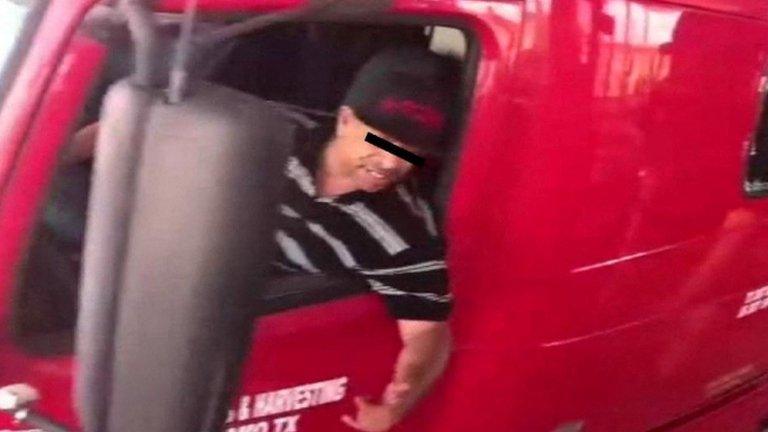
- Published30 June 2022
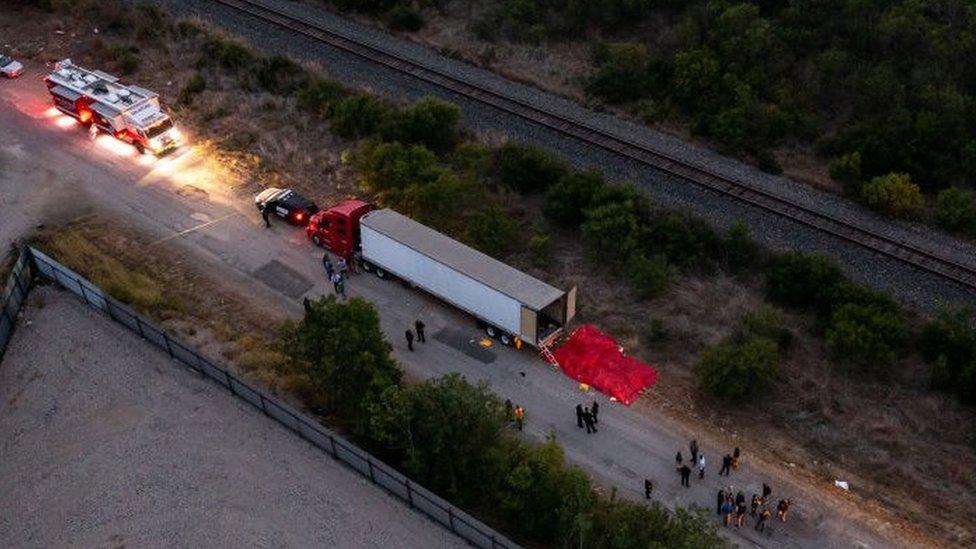
- Published1 July 2022
